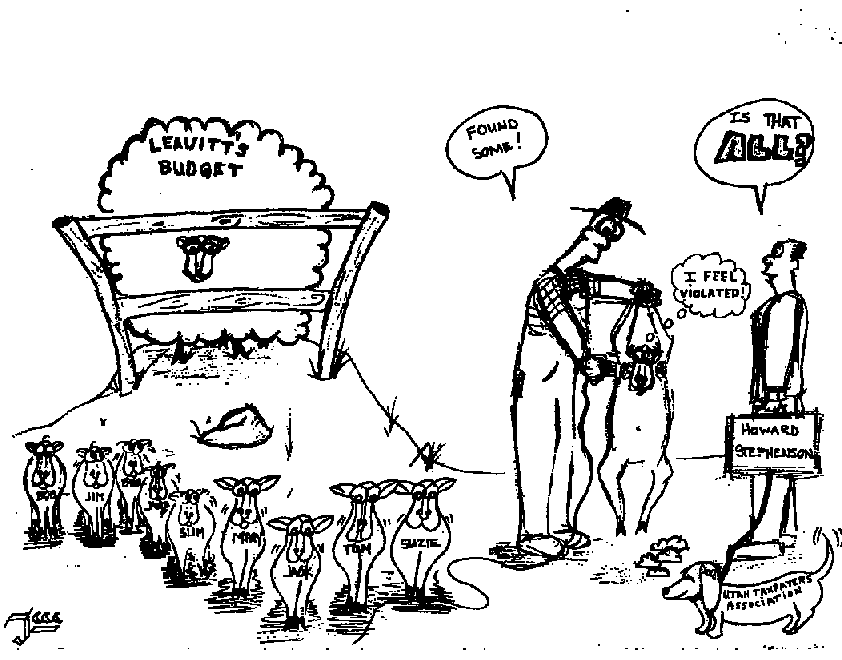|

Why Are Utah Republican
Legislators and the Utah Taxpayers Association Supporting
Harmful Tax Increases?
By Emily Sedgwick
Under the auspices
of "streamlining," Utah has enacted
a bill to extort businesses, destroy its small business-based
economy, and stab fiscal responsibility and state sovereignty
in the back.
During the 2003 session, the legislature passed Senate Bill
147S1, "Streamlined Sales Tax Project Amendments." This
208-page, complex bill drastically alters Utah’s sales tax
laws and brings Utah under the multi-state Streamlined Sales
Tax Project (SSTP). It specifically targeted out-of-state
catalog and Internet sales, and, according to the Utah State
Tax Commission, was supposed to raise taxes by $130 million
each year.
Streamlining taxes is a catchy ploy. SSTP does, in fact,
contain provisions to improve tax system efficiency and reduce
audits for businesses. But the devil is easily seen in the
details, including provisions and definitions that will, in
all likelihood, reduce competition and sovereignty among local
and state tax jurisdictions and increase taxes.
In the battle to limit taxes and spending, definitions are a
big deal, and the way those definitions are formed and
enforced are an even bigger deal.
Take the Multistate Tax Commission (MTC), for example,
currently comprised of 44 states and the District of Columbia
ranging from active members to observers. MTC organizes
conferences throughout the year to formulate SSTP tax code
definitions.
In Indianapolis, Indiana in April 2003 an MTC group of 150
state revenue bureaucrats, lawmakers, and businesses discussed
the tax implications of defining a "bundled transaction," and
whether various changes would tax services that currently are
not taxed.
Another discussion arose regarding a uniform definition for
"television services" to include cable, satellite, and dish
providers – a situation in which a crafty definition could
increase taxes. North Carolina officials are already
salivating, and plan to impose a de facto tax increase
on postage in certain cases by changing business service
definitions.
Can anyone seriously argue that cash-strapped states will not
use these "simplified" definitions to raise taxes? States will
still choose to tax or exempt every service and sale, but will
codify each service and sale according to SSTP-approved
guidelines.
While states will reserve the right to levy different rates
against similarly defined products and services, they will be
pressured to levy taxes in similar fashion to higher-tax
states. States joining SSTP and adopting its recommendation
will seriously compromise their sovereignty with regard to
maintaining competitive tax code definitions of their own.
Big government advocates have claimed that SB 147 S1 is not a
tax at all – but rather a voluntary opportunity for businesses
to contribute more to state government coffers.
What they don’t talk about is SB 147 S1’s stipulation that
businesses that go along with the SSTP project now will not
incur liability for past failures to collect sales taxes when
STTP is fully functioning. In other words, these government
extortionists have implicitly warned businesses that if they
don’t pay their "voluntary" protection fees today, Guido will
rummage through their past records tomorrow – looking for
something to hang them with.
Indeed, the biggest losers of SB 147S1 and STTP will be
businesses – ever-vulnerable targets for sleight-of-hand
definition changes. American businesses already contribute
$378.9 billion in state and local taxes (2002) and 41.3% of
all tax collections. Smaller-sized businesses are most at
risk, because they do not have the staff or resources to lobby
for advantageous definitions at MTC planning meetings
(ironically, big government advocates claimed that SB 147S1
was necessary to "protect brick and mortar" establishments).
Which brings us back to Utah, already the ninth-highest taxed
state in the nation. Tax-and-spend Governor Michael O.
Leavitt, a long-time advocate of Internet taxes, has been
joined by the Republican-controlled legislature in passing SB
147S1. With 62 percent of Utah businesses operating with ten
employees or less, one would think that SB 147S1 would have
been resoundingly defeated.
The opposite occurred, however. Utah lawmakers appear blindly
determined to torpedo the fragile boat that feeds Utah
families and continues to float their unstable economy.
In addition, the Utah Taxpayers Association (UTA), purportedly
a voice against tax increases, actively lobbied for the bill’s
passage. UTA President Howard Stephenson, also a state senator
and a Taxpayer Protection Pledge signer, voted in favor of
this tax increase.
When the legislature was recently informed that revenue
estimates from SB 147S1 had dropped from $130 million to $30
million, Stephenson’s disappointed response was: "Is that
all?"
With leadership like this, who needs enemies?
* *
* * *
Accountability
Utah Note for Readers: Emily Sedgwick is State
Project Manager for Americans for Tax Reform (ATR), the
largest taxpayer advocate organization in America.
Grover Norquist, President of ATR, has Pres. Bush's attention
on taxes and is largely responsible for the success of the
latest federal tax cut.
From ATR's mission statement: "ATR
opposes all tax increases as a matter of principle. We
believe in a system in which taxes are simpler, fairer,
flatter, more visible, and lower than they are today. The
government’s power to control one’s life derives from its
power to tax. We believe that power should be minimized."
For more information on ATR, see
www.atr.org.
Permission to reprint this
article is hereby granted provided that the author,
Accountability Utah, and Americans for Tax Reform are cited.
See the
Taxes & Spending section of our Issues & Alerts page for
more information on Utah taxes, including the poor performance
of both parties on tax issues.
If you need help finding your legislator, visit our
elected official contact page.
Click on Accountability Utah's
cartoon below for an artist's rendition of the state of
affairs for Utah taxpayers.

If you have comments or suggestions, please
email us at info@accountabilityutah.org.
|